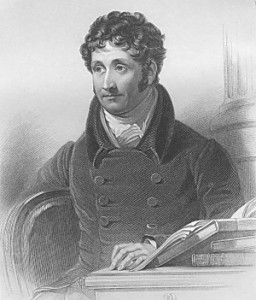 Known for his sentimental poems and patriotic war songs, Thomas Campbell was a Scottish poet born in Glasgow in 1777. The son of a merchant, by the age of 21 Campbell had already achieved a certain amount of fame Pleasures of Hope and he was very much considered a poet of his time, though his popularity began to wane even during his own lifetime.
Known for his sentimental poems and patriotic war songs, Thomas Campbell was a Scottish poet born in Glasgow in 1777. The son of a merchant, by the age of 21 Campbell had already achieved a certain amount of fame Pleasures of Hope and he was very much considered a poet of his time, though his popularity began to wane even during his own lifetime.
Campbell was born into a large family, the eleventh and youngest child. His father was a tobacco merchant but lost a good deal of his wealth when the Americas broke away from Britain. Fortunately for the young Campbell this did not inhibit his future education. Both his parents were well read for the time and considered intellectuals – his mother was considered a woman of elegant tastes with a liking for both literature and music, passions she passed onto her children.
Campbell began his learning at the High School of Glasgow and later went onto University in the city, winning numerous prizes for his poetry. During this time he would work as a tutor during the holidays and began writing more seriously, producing works such as the Ballad of Ullin’s Daughter.
When he graduated, he moved to Edinburgh and continued to work as a tutor, something that continued to support him while he wrote his poetry. He also formed a friendship with Robert Anderson who was editor of The Works of the British Poets. In 1799, Campbell published Pleasures of Hope which achieved almost instantaneous success. It dealt with many issues that were important at the time such as the recent revolutionary fervor in France, the issue of slavery and the partitioning of Poland.

Instead of cementing his sudden popularity with further work, Campbell headed for Germany. In 1800, he found himself in Regensburg just as it was invaded by the French. He then began writing some of his best known patriotic poetry whilst hiding in a Scottish monastery, including works such as Ye Mariners of England. These were uncertain times for Europe and, shortly after, war broke out between England and Denmark, causing Campbell to return home where he wrote the first draft of The Battle of the Baltic.

Moving to London in 1803, Campbell married and decided to settle in the city. During that time he worked as a secretary to Lord Minto, translated foreign news for The Star and continued to write his poetry. Even though he was popular, delivering lectures on poetry and being associated with the likes of Sir Walter Scott, Campbell often suffered financial difficulties. Despite that he helped to found the University of London and, in 1826, was made Lord Rector of Glasgow.
After the death of his wife in 1828, his own health began to suffer and he started to remove himself from public life, although he continued to write and travel, most notably from Paris to Algiers where he wrote his Letters from the South. His other works at this time included the poem The Pilgrim of Glencoe and Life of Mrs Siddons.
Thomas Campbell died in the French port of Bourlogne in 1844 at the age of 71. He is buried in Poet’s Corner in Westminster Abbey.

